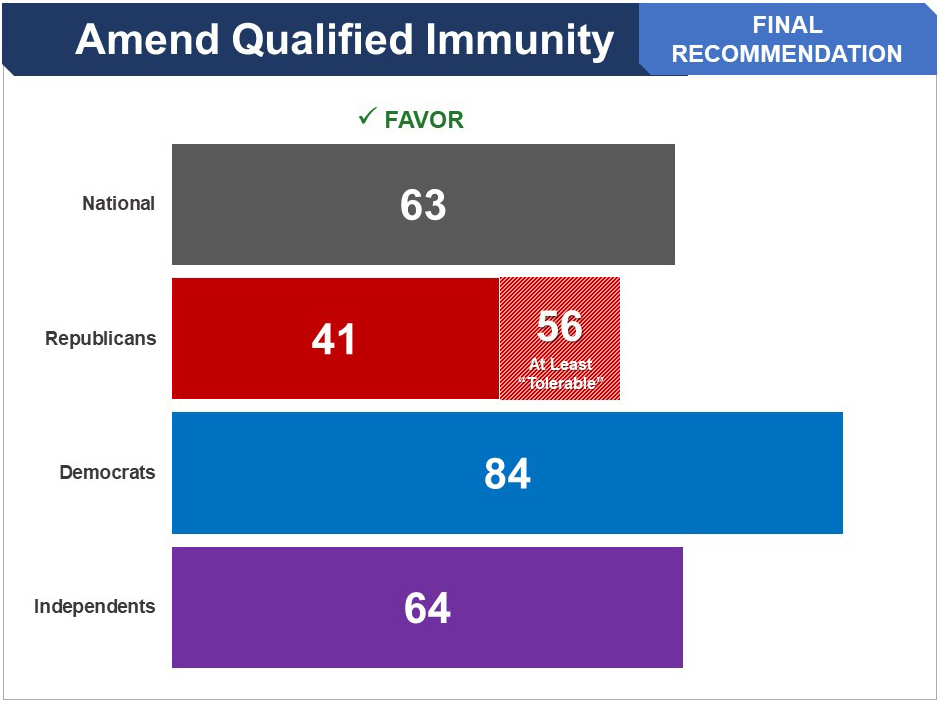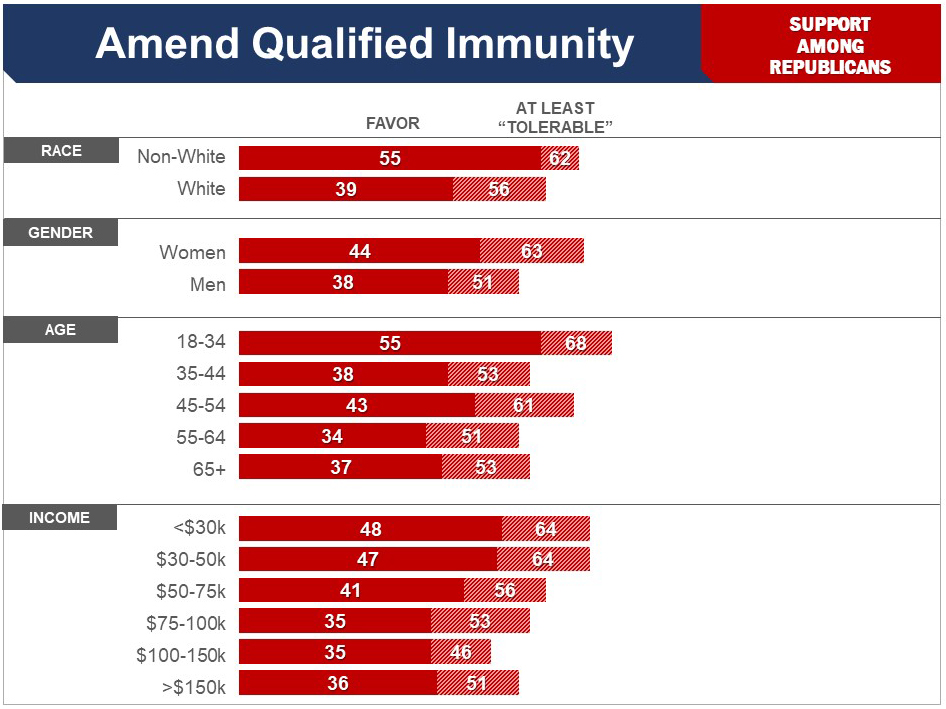
Issue #1 – June 2021
Prolonged Congressional Negotiations on Police Reform Proposals
More than one year after George Floyd’s death, congressional negotiators continue finalizing a bipartisan compromise on The George Floyd Justice in Policing Act. Lead congressional negotiators, Senator Cory Booker, Senator Tim Scott, and Representative Karen Bass, continue to hammer out details of a possible deal with growing pressure from President Biden’s White House. Despite intense debate in the media and Congress, large majorities of both Democrats and Republicans support a wide range of policies that address police reform.
When the Program for Public Consultation (PPC) at the University of Maryland gave a representative sample of 3,226 American voters a detailed presentation of ten police reform proposals in Congress, large majorities favored all of them.
As always, respondents were given a briefing and evaluated the strongest pro and con arguments reviewed by proponents and opponents before weighing in with their final recommendations. Majorities of Democrats and independents favored all ten proposals. Majorities of Republicans favored six of the proposals; the other four were found at least tolerable. Please use our social media toolkit to spread awareness about public support for police reform.
Engaging Citizens in Democracy
Voice of the People, in partnership with Civic Genius, has hosted nearly a dozen Citizen Panels where a representative sample of voters from a congressional district completes a policymaking simulation. Then, at an event that includes the representative of that district and some of the constituents who participated in the survey, the findings are presented, followed by a thoughtful discussion. To learn more, please watch our short video on our Citizen Panel Forum on police reform with Rep. Brian Fitzpatrick (PA-1).

Republican Views on Qualified Immunity
A major sticking point in the congressional negotiations on police reform legislation has been qualified immunity, the legal defense that often protects officers from liability in civil suits against them. PPC’s survey found that 63% of Americans support amending qualified immunity as called for in the George Floyd Justice in Policing Act, including 84% of Democrats and 64% of independents. Among Republicans, 41% are in favor, but 56% find it at least “tolerable.” There is also significant variation between Republicans, depending on age and race. While just 37% of Republicans who are 65 and older support the proposal, a majority (55%) of millenials (age 18-34) do; and while just 39% of white Republicans support it, 55% of non-whites do.



Police Reform
Police Reform Policymaking Simulation: Put yourself in the shoes of congressional negotiators by trying our policymaking simulation on police reform issues, such as qualified immunity, body cameras, a national registry for police misconduct, and much more. We want to hear how you would shape police reform legislation in Congress, and please share!

Citizens’ Assemblies in Scotland
The push to make citizen assemblies a more regular part of the democratic process gained ground in Scotland recently. The Scottish National Party (SNP) ran on a pledge to conduct annual citizen assemblies on important issues facing the country, and won another term. Along with the Green Party, who also support regular citizen assemblies, the two parties have a majority in government.
Citizen assemblies are an innovative tool of public consultation that have been gaining momentum as a way to tackle problems that legislatures have been unable to find common ground on. They are non-partisan events, often spanning multiple weeks or months, in which ordinary citizens are brought together to find solutions to important problems. Participating citizens who are representative of the demographics of the area are provided relevant information about the problems, given time to deliberate, and finally vote on which policy solutions they would like to be enacted.
Scotland first established a national citizen assembly in 2019, made up of around 100 members of the public. After deliberation, they issued a public report, which included 60 recommendations with strong majority support, that covered a range of issues, such as poverty, sustainability, international relations and government transparency. They also recommended that a permanent “citizens committee” be installed in the government so ordinary citizens can regularly have a say in policymaking. The SNP’s inclusion of citizen assemblies in their political platform is a potential look into the future, in which innovative forms of public consultation become a regular part of the democratic process.

Voice of the People has identified nearly 180 positions on which Democrats and Republicans agree. Find out more at www.vop.org/common-ground.

Be the first to comment